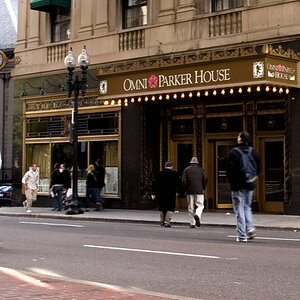Josh66
Been spending a lot of time on here!
- Joined
- Oct 31, 2007
- Messages
- 14,593
- Reaction score
- 1,239
- Location
- Cedar Hill, Texas
- Can others edit my Photos
- Photos NOT OK to edit
So I've been reading this book, The 48 Laws of Power... I can't help noticing how a lot of it applies to photography, or the arts in general. The author makes references to artists throughout the book...
The last paragraph of chapter 23 (Concentrate Your Forces), a chapter that I didn't really think would have anything at all to do with art, made me stop and think.
It made me wonder - is it better to concentrate on one 'style' or discipline of photography, or to dabble in all forms of photography...? The author makes good points for both choices.
Surely, you would be more likely to master something if you put everything into it - but in the long run, could you be doing more harm than good?
Personally, I think you need a mix of both.
(It's a pretty good book, BTW. Half way through it now, and I have to say that almost all of it has everyday applications.)
The last paragraph of chapter 23 (Concentrate Your Forces), a chapter that I didn't really think would have anything at all to do with art, made me stop and think.
(Links are mine, obviously...)Finally, being too single-minded in purpose can make you an intolerable bore, especially in the arts. The Renaissance painter Paolo Uccello was so obsessed with perspective that his paintings look lifeless and contrived. Whereas Leonardo da Vinci interested himself in everything - architecture, painting, warfare, sculpture, mechanics. Diffusion was the source of his power. But such genius is rare, and the rest of us are better off erring on the side of intensity.
It made me wonder - is it better to concentrate on one 'style' or discipline of photography, or to dabble in all forms of photography...? The author makes good points for both choices.
Surely, you would be more likely to master something if you put everything into it - but in the long run, could you be doing more harm than good?
Personally, I think you need a mix of both.
(It's a pretty good book, BTW. Half way through it now, and I have to say that almost all of it has everyday applications.)
As an Amazon Associate we earn from qualifying purchases.



![[No title]](/data/xfmg/thumbnail/39/39498-362f11d9bfd0d9e222faa85b38801745.jpg?1619739056)









